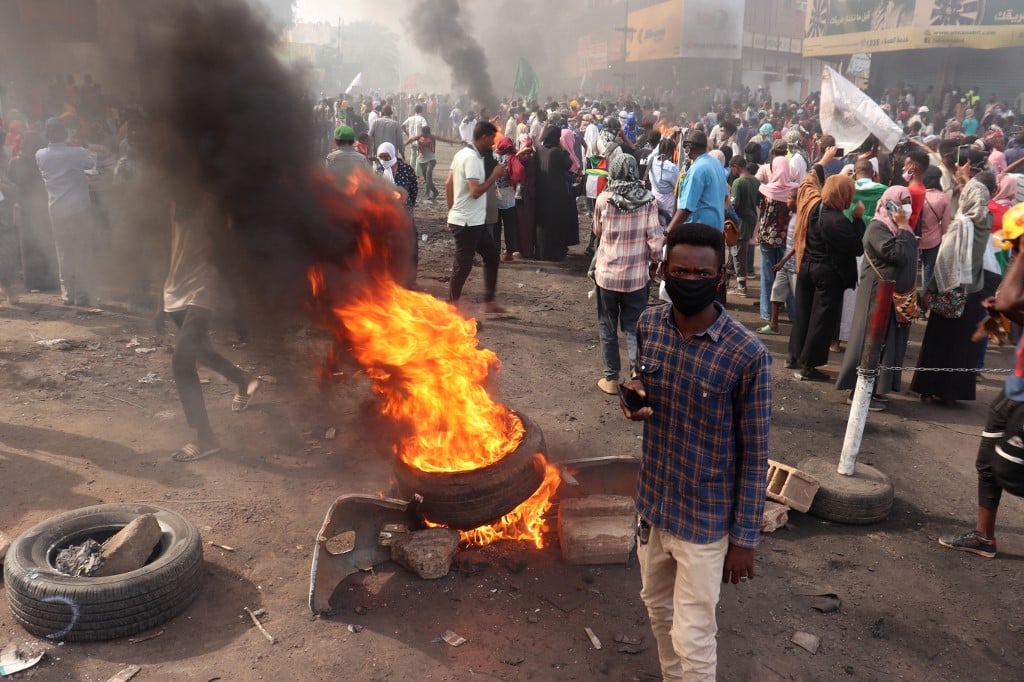The US decision to halt aid, financing and debt relief to Sudan has failed to punish the military government and is instead worsening conditions for citizens who are suffering under the weight of a failing economy, a US analyst says.
Following last year’s coup in Sudan, in which the military seized total control of the military-civilian government, the Biden administration suspended $700m in financial assistance. The Department of the Treasury imposed sanctions on Sudan’s Central Reserve Police in March, accusing it of using excessive force against peaceful protesters.
But analysts say that the current sanctions regime is failing to target the Sudanese military and more can be done to resolve the post-coup crisis. The Sudanese economy is expected to shrink by -0.3% this year, according to the IMF, putting the 46.6m population under additional pressure.
“The missing ingredient is a very strong international response,” says Cameron Hudson, a senior associate at the Center for Strategic and International Studies, former director for African affairs on the White House National Security Council, and previously an intelligence analyst in the Africa Directorate at the CIA.
“We have to recognise that the military has really not suffered in a personal sense any consequences for seizing power…we have to be clear eyed about who that really impacts,” Hudson says.
Hudson says the US must threaten the Sudanese military with further sanctions if it does not take steps towards the return of civilian rule.
“Right now the military are not afraid of any consequences that might come to them, and so they’ve acted with impunity. We have to end that cycle of impunity by making very serious threats and carrying them out if and when the military doesn’t comply.
“We have all the reasons we need to punish the military for their actions over the past year and I think that there’s a feeling within Washington that if we go that route it will make the military less cooperative and less inclined to negotiate. But unfortunately there’s no evidence to support that assumption.”
Deep state digs in
Sudan’s military seized power in October in order to protect key business interests and their control over vast swathes of the economy.
“They seized control again because the civilian government was making a lot of progress in dismantling the regime and was achieving some of the goals they set out for.”
Companies linked to Sudan’s military leaders take a cut of every gallon of oil and every bag of wheat sold in the country as part of a ‘deep state’ network, Hudson says.
“We could sanction them for the coup, we could sanction them right now for supporting Russia in the war with Ukraine, we could sanction them for human rights abuses against civilian protesters – 120 people have now been killed on the streets of Sudan. We could sanction them for grand corruption.”
Revelations in an investigation released by the Organized Crime and Corruption Reporting Project (OCCRP) on Wednesday further strengthens the case for Western sanctions on Sudan’s military leaders for grand corruption.
M Invest, a company allegedly owned by the founder of the Russian paramilitary Wagner Group, Yevgeny Prigozhin, and which reportedly runs the group’s operations in Sudan, agreed to pay a security company operated by Sudanese military intelligence millions of dollars for “security services” and visa processing, according to OCCRP reporters.
The Sudanese firm, Aswar, was also contracted to supply weapons and organise flights for the Russians in exchange for a $200,000 “goodwill fee” and another $100,000 per month, while its taxes and employees’ salaries were all covered by the Russian company, the report says.
Back to square one
In recent weeks US-led negotiations between Sudan’s military and civilian political coalition, the Forces of Freedom and Change (FFC) have neared a political settlement with the military government that could restore a civilian prime minister and give the military a degree of independence.
But with the protest movement largely unable to organise itself into a formal political entity, civilians who have led the resistance to the military since the 2019 revolution are not at the negotiating table.
“So the challenge here is that none of the parties to the negotiations are accountable to the people,” Hudson says.
“Therefore there’s a lot of concern that the negotiations will result in a deal among the elites. If that is the case where will that leave us?”
Want to continue reading? Subscribe today.
You've read all your free articles for this month! Subscribe now to enjoy full access to our content.
Digital Monthly
£8.00 / month
Receive full unlimited access to our articles, opinions, podcasts and more.
Digital Yearly
£70.00 / year
Our best value offer - save £26 and gain access to all of our digital content for an entire year!
 Sign in with Google
Sign in with Google 



